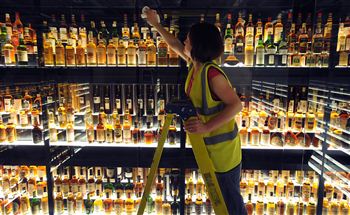NEW research has revealed that fewer than a quarter of Scotch whisky distilleries are now owned by Scottish companies.
The study shows that just 29 of the 118 distilleries – 24.6 percent – were owned by Scottish companies or have most of their shareholders based in Scotland.
A number of independent Scottish companies have been sold to foreign owners in recent years, including BenRiach, which was sold to US drinks giant Brown-Forman for £285 million in April.
Bruichladdich, on the Isle of Islay, was taken over by French company, Remy Cointreau, in 2012 for £58 million whilst private equity group Exponent bought the Loch Lomond Distillery Company’s assets in 2014.

Despite the fall in the number of Scottish-owned distilleries, more than half are still owned by UK companies.
This is thanks to the British drinks giant, Diageo, which still runs 27 distilleries, the most of any company in the industry,
Diageo’s distilleries help keep the UK ahead of France, who have 20 and the Japanese, who now have seven.
The Scotch Whisky Association (SWA) believe that the interest from foreign investors is “encouraging”.
David Williamson, the SWA public affairs director said: “The fact that investors from around the world have such confidence in the sector and want to be part of its success is encouraging.”
The research does not look at how much whisky is produced at each location but rather the number of sites an organisation has.
In second-place, behind Diageo, is Pernod Ricard. The French company owns 15 sites as a result of the Chivas Brothers Scotch whisky section of its business.
Emperador, from the Philippines is one of a number of businesses bunched behind with five distilleries, following their £430 million purchase of Whyte & Mackay in 2014.
Others include Bacardi Limited, from Bermuda, and ThaiBev and its international arm, International Beverage Holdings Limited also has five through its ownership of Inver House Distillers.
The only Scottish independent distiller to make it into the top ten in the list of distillers is The Erdington Group, which has four distilleries.
Scottish distillers are usually smaller in size and most of them are yet to produce any aged whisky.
Over the past two and a half years, ten new distilleries have opened, including the Isle of Harris and Dalmunach.
Scotch whisky must be made in Scotland to be classed as genuine which means that despite the influx of foreign investment, jobs have tended to remain in the country and not be moved overseas.
